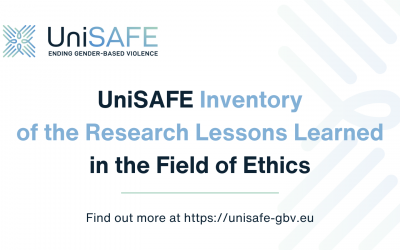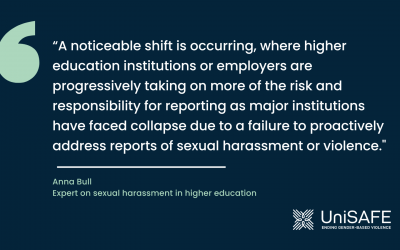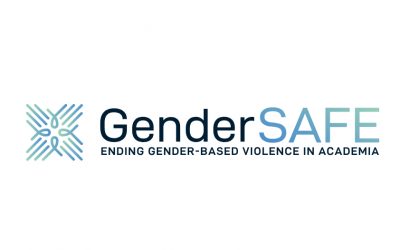The Slovak Institute for Labour and Family Research (IVPR) has led a series of actions to research and eradicate gender-based violence in research organisations and academia in Slovakia.
1. Survey on GBV in public universities
The IVPR surveyed students of public universities in the academic year 2019/2020 to map the incidence of harassing behaviors such as gender-based harassment, unwanted sexual attention, and sexual coercion. The IVPR survey involved 33 faculties and 1,621 male and female respondents, of which 60% were female and 37% were male. This is the first national survey on sexual harassment conducted in the Slovak Republic.
“When students encounter harassing behaviour in the university environment, it can impact not only their motivation to study and pursue their field of study, but also the cohesion of their study teams and their own sense of security and self-confidence.”
Veronika Valkovičová, PhD, a member of the IVPR’s research team.
The main findings:
- Up to 76% of female and male students have experienced gender-based (sexist) harassment while studying at their current university. These included comments with sexual overtones, jokes or derogatory remarks about women or men based on stereotypical perceptions of them.
- 46% of all female and male students also reported experiencing unwanted sexual attention. These included unwanted advances, commenting on body and appearance, unsolicited sharing of materials with sexual content, or invitations to meetings despite rejection.
- 3% of female and male students also reported experiencing sexual pressure from someone in a university setting (experience of threats, promises of benefits for sexual intimacy, e.g. that they would pass an exam as a result).
- Female students were more likely to have experienced someone commenting on their appearance (e.g., evaluating their body and clothing – 46.7% of cases), or being disadvantaged in their studies because of their gender (24% of cases), or to have experienced repeated requests for encounters despite a previous refusal (e.g., requests for a drink/dinner, 19% of cases).
- Male students were more likely to experience being told stories or jokes with sexual overtones (54.7% of cases) or having someone try to discuss sex with them when it was not related to their studies (e.g., about their sex life, 29.2% of cases).
- Those who engage in harassing behaviour in the university environment are mainly male students (37% of cases), male teachers (24.5% of cases) and female students (23% of cases). The results show that males are twice as likely as females to be perpetrators of harassing behaviour.
- Compared to other male and female students, young women and men in the university environment have fewer opportunities to be in contact with teachers. Overall, male and female teachers emerged as harassers in up to 34% of cases. Male and female university teachers appeared most frequently in cases of gender-based harassment (up to 42% of the 1,134 cases), and their behaviour is not negligible in cases of sexual coercion either (accounting for 22% of the 43 cases). For young women, for example, male teachers committed gender-based harassment in 36% of cases and sexual coercion in 32.2% of cases.
- Despite frequent experiences of harassing behaviour, only one third of female and male students who had experienced it chose to confide in someone about the experience; of these, 22% were female students and only 9% were male students. From the interviews, it emerged that male and female students may harbour mistrust towards management or have minimal information about who they can contact: “[At school] it’s not seen as a problem, it’s seen as a normal thing there. Few people identify it as something out of the norm or out of what it should be. So I can’t even really think of how to address it because I don’t really know who to go to.” (Hana). When it comes to the thesis tutor or supervisor, it is not uncommon for them to fear that an official complaint could have a negative impact on their final grade.
- Only 12% of female and male students agree with the statement that they have been sufficiently informed by their university about the issue of sexual harassment. Meanwhile, as many as 80% of female and male students in the survey said that they thought “the school management should take measures to prevent sexual harassment”.
IVPR actions:
Given the enormous experience of sexual harassment in the university environment, the IVPR has prepared:
- a guide for universities on how to address this form of unfair treatment and has opened a free online training programme for them
- specialised training on the prevention and elimination of sexual harassment on campus, to which colleges and universities can subscribe free of charge
2. Development of support services
This research is followed up by another IVPR activity. The national project “Prevention and Elimination of Gender Discrimination” is the systemic institutional provision of counselling activities in the field of gender discrimination, including gender-based violence.
The project is aimed at establishing, stabilising and sustaining a system of integrated protection and support for victims of gender-based violence and reconciling efforts to reduce and prevent it. It focuses on linking different practices and measures, both legislative and non-legislative. The project aims to ensure a coordinated effort by both public institutions and non-public actors to prevent, reduce and effectively support and protect people experiencing gender-based violence.
The national project consists of two main activities:
- support for effective mechanisms to eliminate gender discrimination
- support for the development of services and measures for victims of violence, especially for women, which is a continuation of the project of the Coordination and Methodological Centre for the Prevention of Violence against Women. Part of this activity is the National Hotline for Women Experiencing Violence, which provides 24-hour remote crisis support for victims of discrimination – women experiencing violence – through expert counselling on 0800 212 212. This service is available to women 24 hours a day and free of charge, as well as a counselling email: linkaprezeny@ivpr.gov.sk.
3. Dedicated workshop and seminar at Comenius University
The UNIBA management accepted the offer from the IVPR to organize a workshop on “Sexual harassment in Academia and strategies to fight it” led by Slávka Karkošková this year. The event took place on June 30, 2021 through the MS Teams platform and was attended by the UNIBA management, heads of departments, members of the ethics committee and our Slovak EQUAL4EUROPE team.
Comenius University also offers a seminar called “Introduction to Gender Studies”, which includes the topic of sexual harassment and gender-based violence. This part of the seminar is led by Andrea Fábiková, a member of the EQUAL4EUROPE team.



